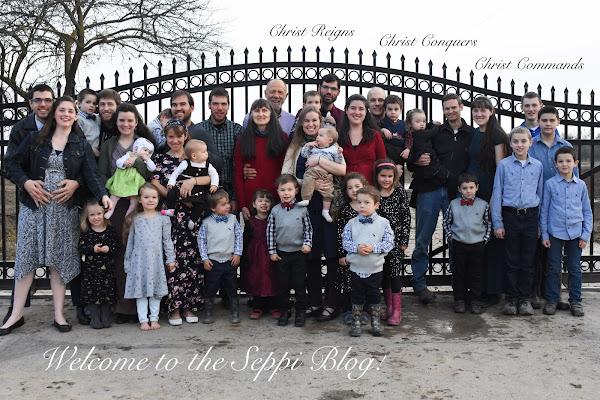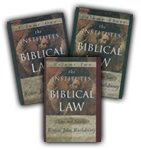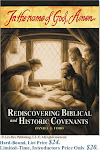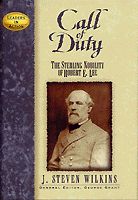Saturday, January 1, 2011
God is Sovereign, not man, not church, not civil government.
Vision Forum Intern Nathaniel Darnell photo by CSHayden.blogspot.com
“God...allows only ministries to function under Him, and very limited ones at that. Civil government is severely limited because in Biblical law its taxing power is limited to head or poll tax, half shekel for every man aged twenty or over per year, neither more nor less (Ex. 30:11-16).
The church is also limited, because of the tithe, God’s tax, is to the Lord, not to the sanctuary. One-tenth of the tithe went directly to the priests. (Num. 18:25-6)
Neither church nor state have any valid Biblical grounds for a position of centrality in society. RJ Rushdoony, Sovereignty p. 11
Labels:
R. J. Rushdoony,
Sovereignty































































34 comments:
Rush is gravely mistaken that the tithe can go to "parachurch" organizations. Scripture teaches no such thing. The Levites were clerics in the OT, and therefore, the tithe, though the ceremonial priesthood has passed away, still goes to the clerical function.
The principle of proportionate giving predates the Levites. (Genesis 14:20) It was a creation ordinance which applied to Gentiles as well as to Jews. (Job 1:5) Paul confirms the practice. (I Corinthians 16:1,2) Believers today should meet needs wherever they find them, as priests themselves. (Romans 12:20; James 2:15-16) While the local church is Christ's bride, she has no exclusive claim to members' money. (Acts 5:4)
Paul confirms the practice, and the giving was obviously collected by the church, which disproves your point. Thank you for making my point, however. Also, Acts 5:4, if I am not mistaken, has nothing to do with tithe, but was entirely voluntary.
Adam is right. Might I suggest Gary North's book, "Tithing and the Church"?
what is a para church organization or ministry any way? how can you say that a ministry is" para" or alongside the church just because it may draw its resources from several sources both individuals and denominations and may not be the creation of one particular church or denomination. the ministry should still be considered as part of the church universal,and therefor able to recieve tithes or portions of the tithes and free will offerings given by Gods people
acts 5 was voluntary and would not be considered tithe. the tithe is a tenth of the persons increase
II Corinthians 8:16-19 demonstrates that para church giving sometimes was appropriate, at least in apostolic times.
I think the term para church would have been a foreign concept to the apostolic church
Tom, I think you are referring to the fact that Titus was "chosen by the churches", but this makes nothing for your point at all, and rather for us. Titus himself was a presbyter, and the actions of a presbyterial body, as ordained by Christ, are ecclesiastical functions, and not "para" church. The local church is not *the* church, as Christ has ordained presbyteries, councils, general assemblies, synods, etc. as part of the government of His church.
Councils, presbyteries, synods, etc., are all parachurch since the Bible usually speaks of churches in particular locations. (I Corin.1:2; II Corin.1:1; Galatians 2:1 ("churches" plural); I Thess.1:1;II Thess.1:1; Rev.2:1; 2:8; 2:12; etc. When it speaks of "the church" universal it is almost always referring to people, not an institution with officers, sacraments, and an organized membership.
I agree with Adam. Non church giving is a free will offering that should be above the tithe. The tithe is for the work of the institutional church. I think our problem in America today is that we don't respect the institutional church the way we should. We take the "priesthood of the believer" to the level where we don't want to submit to any ecclesiastical authority. Now, I do agree with Rushdoony when he argues that the tithe is not compulsory-- meaning the church hasn't the authority of the sword to compel members to give. However, the church can discipline members for rebelling against the tithe as much as it can discipline for violation of any ordinances of God.
By the way... I am am a director of a parachurch ministry that I believe has NO CLAIM on God's tithe-- but I encourage everyone to give a free will offering regularly!
Tom, how do you know that there was only one congregation in each city. Do you seriously think that the "church at Jerusalem" was one congregation?
I would encourage you to read some of the Westminster Divines on presbyterian church government. Galatia was a region, and would necessarily had several adjudicating bodies.
Adam, I would encourage you to read the Bible without your preconceived ideas. Nothing in Scripture requires that church government be larger than local congregations; Synods, councils, presbyteries larger than local sessions, etc., should have only advisory authority and are parachurch.
By the way, I support parachurch organizations. They are sometimes necessary for theological education, dealing with foreign governments, etc.
Tom, was Paul's role 'advisory' to all the Churches with whom he corresponded? Clearly, the apostles and early church leaders had authority that crossed beyond the local session. And I would take issue with your exhortation to Adam to "read the Bible without pre-conceived ideas." that is an impossibility for everyone. We all come to the Word of God with pre-conceived ideas. That is why there were Church councils-- to hash through the Scriptures to find truth where there was disagreement. What you are saying is that Adam is wrong to reference the teachings of Church Councils, but it's okay for you to rely on the council of your own brain with its "pre-conceived ideas"
Tom, in addition to Matt's point above, Acts 15 was an authoritative council that issued binding decisions on all churches in existence. So much for your unprejudiced reading of Scripture :-)
Everyone is prejudiced... That's why we have to submit to each other-- individually and corporately as local congregations. Sometimes individuals go off reservation theologically speaking... And so do individual churches as the New Testiment shows us time and time again.
It appears that this format is not conducive to conveying Christian charity in our discussions. If I have offended others, please forgive me.
A careful reading of the letters in the NT shows clearly that in some of the places there were multiple congregations, usually meeting in people's homes, in some of the cities. Paul in one letter actually gives specific mention of several such churches which meet at "the house of so and so"... mentioning several in one letter, addressed to "the churches" in that city,. Yes, there is the sense where "church" is used for the church universal... ALL believers everywhere. But no letters were written to the whole churhc.. they were aaddressed to the church(es) at such and such a place. It is further quite clear that in each local assembly there were elders appointed over that congregation who came from within THAT congregation. Sure, the believers in a given city, spread throughout it, did maintain a certain level of interaction... but this does not seem to have been beyond friendshi, the occasioinal working together, etc... and sharing in the life in Christ they all had ben brought into. Nowhere do we see clearly in scripture anywhere a reference to the sort of interchurch (local congregational) authority structure, hierarchy, etc such as we observe today. Nor do we see anything even remotely similar to today's denominational superstructure, ownership of buildings by the denomination, etc.... no, it was small, simple, low maintenance, and made excellent use of resources.... some sixty percent of budgets in today's congregations are expended upon physical plant, administration, and much of the balance on "staff".
The Westminster men had a pre-determined agenda upon which they were intently working.... and thus were prejudiced in many of their scriptural exegeses. When it comes to the area of church polity, organisation, funding, etc, I prefer to avoid them and consult scripture, and perhaps search for other resources than the Westminster folk.....
Nor do I recall anywhere where the NT specifically indicates that any given church ever :"collected" the tithes and offerings.... other than the collections Paui mentions for the church in Jerusalem undergoing hard times due to persecution. But that was not "the church" as organisation "collecting" the funds.. no, Paul merely instructed those who wished to contribute to bring it to the weekly believers' meeting where he would then collect it and see it got where it was supposed to. Contrast that with today's "offering envelopes", accounting, year-end reporting on amounts given from each one,...
today's costly, inefficient, cumbersome, burdensome physical plants and attendant administration and maintenance costs are tieing up far too much money that SHOULD be going to effectively proclaim the gospel. And this would include taking care of first those within the church and also, equally important, those without the church and in need.
It is true, the "sphere" of control presently exercised by the church is far too broad, and unscriptural. As with any form of government, the size of it continues to increase as time goes on. Let each congregation govern itself from within, as we see indicated in the NT writings. Sure, there will be interaction, and should be.... and the multitude of assemblies will watch over each other and be vigilant against error. Yes, the Council at Jerusalem was for the WHOLE church, at all times and in all places. They were faced with an unique situation and did not yet have the canon of scripture to guide them. We now have THEM... and their writings. ow the scripture is complete there is little need for such overarching proclamations.
Nick,
I would encourage you to read the history of the Westminster Assembly, and you will see rather rapidly that most of the men who came to the Assembly were not Presbyterians at the beginning, but were by the end of the debates. If you ignore the debates you will remain ignorant about 1. What their biblical arguments were, and 2. You will speak ill of the dead without cause.
I have already mentioned an authoritative judicial body that issued decrees to be obeyed by ALL of the churches. It's in Acts 15. Therefore, your analysis is flawed at its core.
Tom, no worries. You have offended no one as I can see. You just have expressed your viewpoint on this very relevant topic. Thanks for doing this.
Perhaps, at some point, I will try and find, then read, the arguments... though I've read many of the "proof texts" upon which such things are based..... and find them unconvincing on the whole. They fit if a presupposed model were adopted.....
as to Acts 15, I just reread it now... it is precisely the one I mentioned as supporting my position... the "council of Jerusalem", wherein a significant part of the church leadership from certain areas came together to sort out some "troubling matters' that had been sowing division, with the intent to get at God's desire for these things. Yes, it mentions elders, apostles, etc, gathering together to come to an agreement. Nowhere does it give any basis to conclude these were some "presbytery" or formally organised body of "church government"... it merely mentions "some of the elderrs" from here and there, and other bretheren, all given in their lives too the building up of the church. There is NO indication of any "hierarchy", organisation, authority structure, multi'layered system of management.... no more than concerned believers seeking to know God's heart on a matter.
and, as I said, they reached some conclusions and then set about to bear the results to places where those results were needed to being about restoration and peace. Some of that was written, some oral. Their conclusions were simple, not onerous, and were considered binding upon all, as they had sought, and believed they had got at, Got's heart on the matter.
I further said that today, since we have THEIR work and the rest of the scriptures, we don't have much need for such councils today. We both hold to the sufficiency and inerrancy of the WHOLE of the scriptures.... thus such a core issue could not come up, as the canon of scripture speaks to ALL things pertaining to life and godliness. These men, elders from local gatherings of believers (churches) helped to complete that canon.
Thus, this entire chapter does not show my position "flawed at its core", but as valid. UNLESS one desires to read into the chapter things that do not arise from within it on a plain and simple reading...... a practice I scrupulously avoid. Or at least try to.....
Nick, I think you need to study presbyterian government more because what you just described in Acts is what a presbytery and general assemby is. The general assembly is a meeting of equals-- all elders. No priests, bishops, cardinals, etc. And the fact that the council in Acts became a part of the canon is exactly why church councils are relevant today. That was our example of how to handle doctrinal conflicts as one body. But if every congregation of self-ordained elders is a law unto itself, then you have replaced one Pope with thousands.
Just one thing: Regardless of whether you agree or disagree with Rushdoony about the tithe, I sure hope everyone here reads the books "Sovereignty" that I am pictured holding above. It is simply one of the ten most essential books every Christian should read, making application of the principle of the sovereignty of God to every sphere of life: family, church, government, art, education, etc. Incredible book. It will rock humanistic assumptions you may not have realized you had.
The history of congregational government is that it leads to the "papal authority" of the individual. Just consider the history of the strongly Calvinistic but congregational churches in New England. Many first became baptists because of the priority placed on man's action of professing his faith before becoming a member of the church. This led to an abandonment of Calvinism in favor of Arminianism, which puts salvation itself into man's hand (not just church membership). This quickly led to full blown Unitarianism, where the individual becomes god. Thankfully, God's grace doesn't always permit us to logically follow our beliefs to their ultimate conclusion. I have many Baptist brothers who would as soon join al Qaeda than a Unitarian church. ;-P
Forgive me if my comments sound harsh. Facebook stinks as a forum for discourse. Good debate all around, but the only thing I think it helps us accomplish is trying to make our point using as few words as possible!!! Good exercise.
"I love Sovereignty. One of my favorites!"
Matt, I said nothing about "self appointed elders", or "thousands of popes". In acts, those elders who joined in the meeting were almost certainly appointed by the likes of Timothy, Paul, and others like them. The FACT that they always came out of the very same congregations they "elded" is clear. And that can, and does, hold true today, thouugh not often.
I am quite familiar with the current model of presbyterianism, having been involved in a few churches that adhere to that model. Today's "presbytery" is more like a select standing committee having authority over a region comprising a number of churches of one denomination. They will have little to nothing to do with the similarly structured presbytery of some other denomination in the same territory.... at the local level, there is one "pastor" or lead elder in each congregation, almost always hired from Kalamazoo or Sudbury, comes in and runs the church as a CEO would a corporation. Eventually, a few faithful men will be appointed or elected elders, but these function more as an adivsory board, liason between the "foreign" pastor and the "people", and/or a group of under-managers answering to the "pastor" or popeling. They rarely if ever teach, leave most of the "ministry" to the "pastor", and are generally pretty much interchangeable with many of the other men of the congregation who have been there more than a couple of years. Some churches never get round to installing elders, leaving ALL duties to the "pastor" or CEO.. this being VERY dangerous, because men being corrupt as we are, such power eventually will runh amok, turning the church into a one man show... a dictatorship. I've seen it happen when there are either no other elders, or the elders are weak and easily influenced by the CEO. Under the typical presbyterial system of polity that lead "pastor" will most often be that congregation's representative or voice in the standing committee called "presbytery". This puts him in the dangerous position of being the ONLY source of information or reporting from that congregation, and, of course, that man will ONLY let the others hear what falls to his benefit to hear. Major corruption can then brew within that church congregatiuon.. and I've seen this happen as well.
In contrast, the biblical pattern is that each congregation will have a number of co-equal elders, all sharing all of the duties and responsibilities involved in the leadership of the church. There is no "lead" or "head" elder, they have all come from within the congregation and serve that one. They should also seek out and build sound relationships with other such men in their immediate vicinity. Openness, accountability, transparency, are all needful hallmarks of these relationships. And their chief aim in working with the people is to immpart the giftings THEY may have in equipping the saints for the work of the ministry... which is almost never seen in the typical presbyterial system. I've known of a few exceptions, but I don't use all my fingers to tell them.
I see absolutely NO context in the entire NT where some form of standing central authority over a number of local congregations is mentioned, let alone specified. The council described in fifteenth Acts comes nowhere close to this sort of thing... annual meetings to decide what "action" must be taken on what "issues", a layered network of authority leading up to state, regional, and/or national "heads of state" ruling over an entire denomination.... no precedent.
On the other hand, local congregations, each with their own set of multiple co-equal elders having come up from within their own congregation, abd those several local assemblies from time to time working together, or their members so doing, working on various specific projects or avenues of service, meanwhile intent upon passing along their own particular giftings to the members of their own assembly so that the others are fully equipped, mature, lacking nothing, fully able to lead their own congregations as the body of Christ in that area grows... or in the event one or more of them might be moved on to another area.
There is one specific area or situation where I DO see the elders working in concert not only within their own congregation but with those leaders of others in the area.. and that is in the area of church discipline. When George takes up with Sally and she leaves her husband and kids to be with George, and they both continue on in the church as if there was nothing funny going on..... it MUST be dealt with, on up to bringing it before the elders (having fulfilled all the steps of Matthew 18, and similar passages). The elders will examine the testimony, perhaps meet with George and Sally, and if they refuse to leave off their obvious sin, they are to be run out of that congregation.... and the WHOLE CHURCH must be told, and commanded to treat them as pagans..... this can only happen when the elders oof the various congregations in that city are in functional relationships with each other. But, tell me.... with this presbyterian system of polity, how often will the elders of First OPC actually have a conversation with the elders of the RPCNA, CRC, CREC, PCUSA, and let THEM know of George and Sally's behaviour, along with the fact they are now disfellowshipped...... this almost never happens. Why? If it DID happen, George and Sally would be run right back out of any other congregation they might consider trying to join. In all my years as a christian, I have only ever heard of this happening ONCE..... in perhaps hundreds of incidents where gross sin was discovered and dealt with in the local congregation, resulting in the offenders being put out from amongst them... meaning ONLY the local assembly. Less than a month later they were heard to be "in felowship" at the XYZ church the other side of town....... so, your presbytyrian form of polity does not extend to the other congregations in that town... unless they are of the same denomination. Thus, the CHURCH in that city is compromised, divided, weakened.... and has little impact upon the larger culture.
I think I said "self-ordained elders" not self-appointed because I believe the laying on of hands is biblical. And i was speaking from experience of knowing self-ordained pastors in congregational churches-- because many reformed congregational churches are composed of maybe 2 or 3 families. But I also know many large congregational churches with elders who were elected by the congregation and ordained by other elders from other churches. So, it's a minor point in this discussion. And yes, I have seen many examples of Church discipline within the Presbyterian system. And the neat thing was that most instances took place outside the denomination. I have personally gone to OPC elders on a matter of discipline even though I was not a member of an OPC church. I have seen excommunications respected across denominations of Presbyterian churches (because most require a letter of transfer from your previous church before you can join). I have even witnessed an excommunication from a congregational church respected by a presbyterian church. I have also witnessed a discipline case involving elders in such a small Presbyterian denomination that elders from other denominations were brought in as impartial judges (city of refuge principle).
I believe the example you gave of George and Sally can more easily happen in a congregational setting, since discipline technically goes no further than the local body... And George and Sally can theoretically start their own congregation (a.k.a. Home churches).
But I know you will agree that personal experience is no substitute for the teaching of God's Word. And I believe the example in Acts is very clear. There is a presumption that the council has authority and decisiveness that is not found in the Southern Baptist Convention and other congregational associations that are purely advisory.
The priesthood of the believer does not mean we all get to be our own priests. It means we enjoy the benefits of access to God, like the temple priests of the OT, instead of going through the sacerdotal system that Christ's work ended. But Christ did not destroy the authority of the Levitical class so to speak. We have elders and deacons. We are told that elders and deacons have authority. We are told render them due respect and submit to their leadership. And we are given the example of elders of diverse congregations coming together to settle disagreements-- in a binding fashion (because elders are also under authority). That is why in the presbyterian system, there is no Pope. But in the congregational system, every congregation has its own "seat of St. Peter."
It is no coincidence that most presbyterian churches are reformed (at least in their confessions), while most congregational churches are arminian. Arminianism exalts the autonomy of man... So it naturally leads to the formation of churches that are autonomous as well.
Thankfully, there are many fine exceptions to this... and I'm pretty sure, Nick, you are one of them.
I think I said "self-ordained elders" not self-appointed because I believe the laying on of hands is biblical. And i was speaking from experience of knowing self-ordained pastors in congregational churches-- because many reformed congregational churches are composed of maybe 2 or 3 families. But I also know many large congregational churches with elders who were elected by the congregation and ordained by other elders from other churches. So, it's a minor point in this discussion. And yes, I have seen many examples of Church discipline within the Presbyterian system. And the neat thing was that most instances took place outside the denomination. I have personally gone to OPC elders on a matter of discipline even though I was not a member of an OPC church. I have seen excommunications respected across denominations of Presbyterian churches (because most require a letter of transfer from your previous church before you can join). I have even witnessed an excommunication from a congregational church respected by a presbyterian church. I have also witnessed a discipline case involving elders in such a small Presbyterian denomination that elders from other denominations were brought in as impartial judges (city of refuge principle).
I believe the example you gave of George and Sally can more easily happen in a congregational setting, since discipline technically goes no further than the local body... And George and Sally can theoretically start their own congregation (a.k.a. Home churches).
I know you will agree that personal experience is no substitute for the teaching of God's Word. And I believe the example in Acts is very clear. There is a presumption that the council has authority and decisiveness that is not found in the Southern Baptist Convention and other congregational associations that are purely advisory.
The priesthood of the believer does not mean we all get to be our own priests. It means we enjoy the benefits of access to God, like the temple priests of the OT, instead of going through the sacerdotal system that Christ's work ended. But Christ did not destroy the authority of the Levitical class so to speak. We have elders and deacons. We are told that elders and deacons have authority. We are told render them due respect and submit to their leadership. And we are given the example of elders of diverse congregations coming together to settle disagreements-- in a binding fashion (because elders are also under authority). That is why in the presbyterian system, there is no Pope. But in the congregational system, every congregation has its own "seat of St. Peter."
It is no coincidence that most presbyterian churches are reformed (at least in their confessions), while most congregational churches are arminian. Arminianism exalts the autonomy of man... So it naturally leads to the formation of churches that are autonomous as well.
Thankfully, there are many fine exceptions to this... and I'm pretty sure, Nick, you are one of them.
Post a Comment